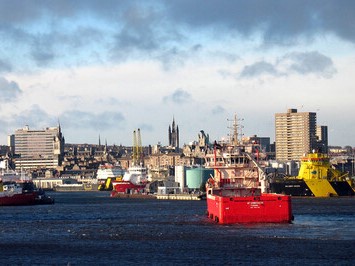The University of Aberdeen will join forces with other Scottish institutions to explore lessons from the past which can help coastal communities cope with the move to renewable energy.
From the use of whale oil for lighting in the 1800s to the production of oil and gas from the North Sea in the 1970s, many UK coastal regions have flourished then suffered from the rapid changes of shifting industry. These past transitions will be examined by academics led by Heriot-Watt University with the aim of boosting the resilience of coastal communities as they respond to current changes in energy production.
History shows that previous energy transitions have led to profound environmental and socio-cultural change for local communities due to their often boom-and-bust nature but most analyses focus on technical and economic criteria and rarely address environmental, social, cultural, and institutional impacts or whether transitions are ‘just’ - as fair and inclusive as possible for everyone concerned.
The project, which is called TRANSitions in Energy for Coastal communities over Time and Space (TRANSECTS), aims to fill this knowledge gap and is one of four projects to share £14.8 million in funding through the Resilient Coastal Communities and Seas Programme. Funded by UK Research and Innovation – the UK’s national funding agency for investing in science and research – and the UK Government’s Department for Environment, Food and Rural Affairs (Defra), the programme draws on expertise from multi disciplines across all four nations.
The University of Aberdeen will work in partnership with Heriot-Watt University, the University of Highlands and Islands, University of Strathclyde, and University of Hull, together with industry partners such as Daryl Burton Ltd and stakeholders from government, marine management and offshore energy.
The east coast of Scotland will be one of three case study areas where researchers will combine scientific data on the impacts of past energy transitions on factors ranging from migration, employment to mental and physical health with testimony and archive material to build a picture of ‘the human side of energy transition’.
Other areas in focus include Humber in England and the Orkney islands archipelago.
The Aberdeen research will be supported by a £718,000 share of the funding and will bring together an interdisciplinary team including Dr Daria Shapovalova (Law), Professor Tavis Potts (Geosciences), and Dr Kate Gormley (interdisciplinary fellow), supported by a post-doctoral research fellow and research assistants.
This builds on the expertise developed in the Just Transition Lab examining theoretical and applied dimensions of an orderly and fair transition to a low-carbon future. It will draw on the team’s expertise and experience of place-based research, just transition, community participation, and stakeholder engagement to provide new understanding.
Dr Shapovalova said: “This project is a unique opportunity to examine the human side of the energy transition. We will use the knowledge of past transitions – for example from whale oil to petroleum – and case studies to understand how coastal communities experience change.
“Aberdeen and the north-east are no strangers to the impact of changes in technology, and we will use the knowledge and expertise we developed in place-based interdisciplinary research of transitions to contribute to this excellent project. We look forward to working with other our academic, community, industry, and government partners to deliver a theory of change for community-oriented marine energy transitions.”
In late August, Aberdeen is hosting the first in-person meeting of the consortium which will serve as a basis of the future research agenda and case studies.


